Principles of Modals (Part - 1) - Modals | English Class 8 PDF Download
Modals are auxiliary verbs used to express the mood or attitude of a speaker. They are always followed by a main verb.
For example:
(i) My friend may come today.
(ii) He should write to his father just now.
(iii) Shuchi can sing and dance.
(iv) Would you open the window, please?
Modals are term which expresses moods and attitudes such as possibility, advice, ability and request.
All the Bold words in the uses and examples given below in this doc are modals.
Most commonly used modals are: will, would, can, could, shall, should, may, might, must, ought to, need and dare.
These modals are used to suggest permission, ability, possibility, suggestion, advice, duty (obligation), promise, intention, request, necessity, compulsion, and wish.
Remember these points
1. Modals do not change form with the person and number of subject. The subject remains the same; as,
(i) He will go tomorrow.
(ii) They will go tomorrow.
2. The main verb after a modal must be in the base form.
Uses of ‘CAN’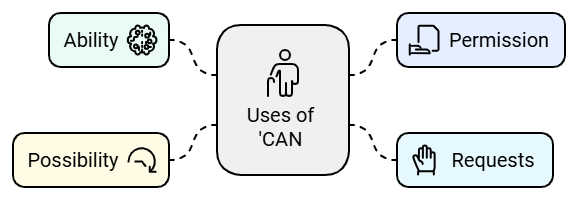
1. Can is used to say something is possible or someone has ability or an opportunity. This modal is used for the present.
For example:
(i) My friend can speak for several hours.
(ii) I can solve this problem.
2. Can is used for permission.
For example:
(i) Raman can go outside.
(ii) Can I come in, Ma’am?
3. Can is also used for requests.
For example:
(i) Can I go to play?
(ii) Can you lift this bag for me?
4. Can is used to express possibility.
For example:
Accidents can take place anywhere.
Our carelessness can invite problems.
Uses of ‘COULD’ (Past form of ‘CAN’)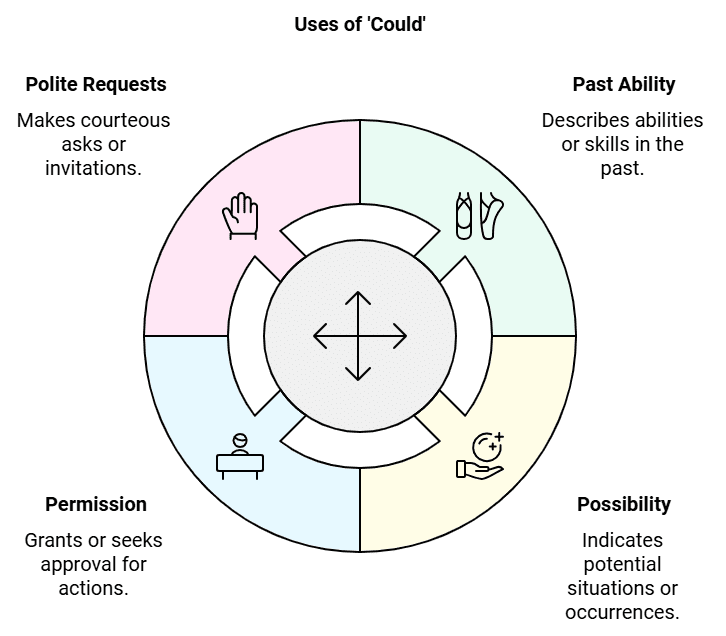
1. Could is a modal auxiliary verb used for the past. It is used to say something is possible or someone has ability or power.
For example:
(i) Ritu could dance well when she was young.
(ii) My brother could run fast when he was in lower classes.
2. Could is used to express possibility.
For example:
(i) Mother could be in the kitchen.
(ii) I could be present in the party.
3. Could is used for permission.
For example:
(i) Could I rest here for a while?
(ii) Could I go home now?
4. Could is used to express polite requests.
For example:
(i) Could you come with me, please?
(ii) Could you give me a glass of water, please?
Uses of ‘WILL’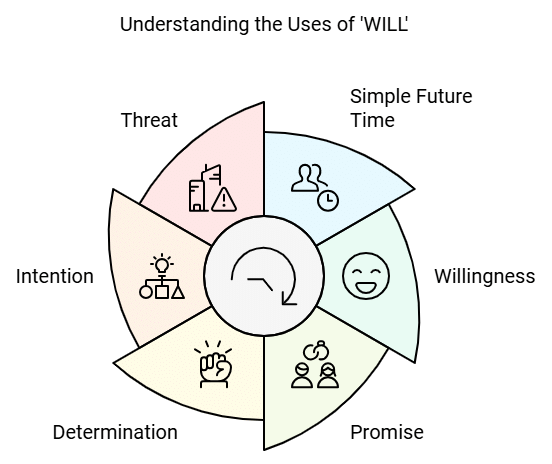
1. Will is used in the Second and Third Persons to express simple future time.
For example:
(i) Rita will sing a song.
(ii) They will dance.
2. Will is used in the First Person to express
- willingness; e.g.,
- (i) I will come with you.
- (ii) We will support the artist.
- a promise; as,
- (i) I will obtain good marks.
- (ii) We will go to a movie.
- determination; e.g.,
- (i) I will never hurt other's sentiment.
- (ii) We will take care of the dignity of others.
- intention; e.g.,
- (i) I will go to the market with my father.
- (ii) We will go to Kulu Manali from Shimla.
- a threat; e.g.,
- (i) I will teach you a lesson.
- (ii) We will turn you out if you shout.
Uses of ‘WOULD’ (Past form of ‘WILL’)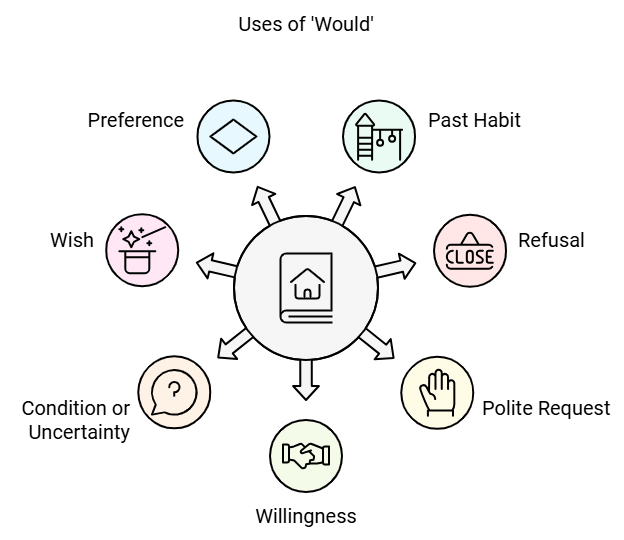
Would is used to
1. express past habit; e.g.,
(i) My brother would go to the market with papa in his childhood.
(ii) Simran would often sleep early.
2. indicate refusal; e.g.,
(i) The machine wouldn’t work properly.
(ii) Soha wouldn't wake up in the early morning.
3. express polite request; e.g.,
(i) Would you please give me a glass of water?
(ii) Would you lend me your dictionary for a day?
4. express willingness in the past; e.g.,
(i) I would accompany you wherever you go.
(ii) He would follow his teacher's advice.
5. denote condition or uncertainty; e.g.,
(i) I would attend his marriage ceremony, if I were invited.
(ii) Amit would succeed if he worked hard.
6. express a wish; e.g.,
(i) I wish you would leave me alone.
(ii) Would you like to accompany me?
7. express preference; e.g.,
(i) I would rather work than gossip.
(ii) He would rather start now.
Uses of ‘SHALL’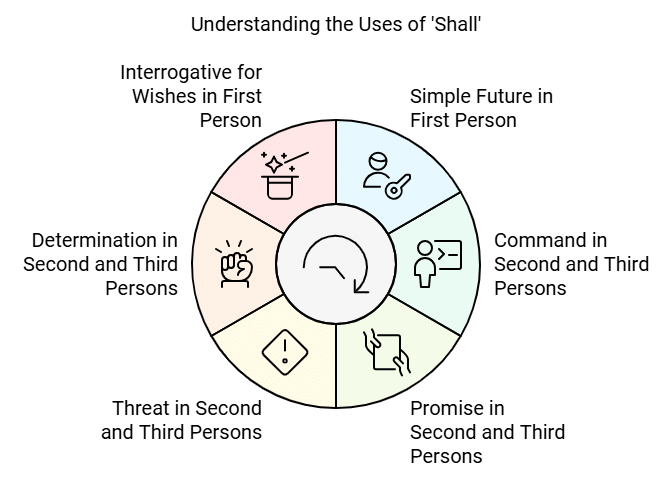
1. Shall is used to denote Simple Future time in the First Person; e.g.,
(i) I shall take part in the painting competition.
(ii) We shall start our journey tomorrow.
2. Shall is used in the Second and Third Persons to express
- a command; e.g.,
- (i) You shall arrive on time.
- (ii) Reema shall tell the truth.
- (iii) They shall go to Haridwar.
- (iv) Children shall dance beautifully.
- a promise; e.g.,
- (i) You shall get a promotion very soon.
- (ii) You shall be rewarded for your honesty.
- (iii) My brother shall do good in the coming test.
- (iv) He shall purchase a flat very soon.
- a threat; e.g.,
- (i) You shall be get out if you use bad language.
- (ii) Students shall be punished if they make noise.
- determination; e.g.,
- (i) You shall help me.
- (ii) She shall prepare noodles.
3. Shall is used in the First Person in interrogative sentences to know other’s wishes; e.g.,
(i) Shall I fetch a doctor?
(ii) Shall we go to see a movie today?
|
36 videos|330 docs|56 tests
|
FAQs on Principles of Modals (Part - 1) - Modals - English Class 8
| 1. What are modals and why are they important in English grammar? |  |
| 2. Can you give examples of common modal verbs and their uses? |  |
| 3. How do modals change the meaning of a sentence? |  |
| 4. Are there any rules for using modals in questions? |  |
| 5. What is the difference between "must" and "have to"? |  |

















